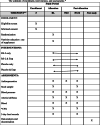The effects of 16-weeks of prebiotic supplementation and aerobic exercise training on inflammatory markers, oxidative stress, uremic toxins, and the microbiota in pre-dialysis kidney patients: a randomized controlled trial-protocol paper
- PMID: 33243160
- PMCID: PMC7689649
- DOI: 10.1186/s12882-020-02177-x
The effects of 16-weeks of prebiotic supplementation and aerobic exercise training on inflammatory markers, oxidative stress, uremic toxins, and the microbiota in pre-dialysis kidney patients: a randomized controlled trial-protocol paper
Abstract
Background: Chronic kidney disease (CKD) is characterized by dysbiosis, elevated levels of uremic toxins, systemic inflammation, and increased markers of oxidative stress. These factors lead to an increased risk of cardiovascular disease (CVD) which is common among CKD patients. Supplementation with high amylose maize resistant starch type 2 (RS-2) can change the composition of the gut microbiota, and reduce markers of inflammation and oxidative stress in patients with end-stage renal disease. However, the impact of RS-2 supplementation has not been extensively studied in CKD patients not on dialysis. Aerobic exercise training lowers certain markers of inflammation in CKD patients. Whether combining aerobic training along with RS-2 supplementation has an additive effect on the aforementioned biomarkers in predialysis CKD patients has not been previously investigated.
Methods: The study is being conducted as a 16-week, double-blind, placebo controlled, parallel arm, randomized controlled trial. Sixty stage 3-4 CKD patients (ages of 30-75 years) are being randomized to one of four groups: RS-2 & usual care, RS-2 & aerobic exercise, placebo (cornstarch) & usual care and placebo & exercise. Patients attend four testing sessions: Two baseline (BL) sessions with follow up visits 8 (wk8) and 16 weeks (wk16) later. Fasting blood samples, resting brachial and central blood pressures, and arterial stiffness are collected at BL, wk8 and wk16. A stool sample is collected for analysis of microbial composition and peak oxygen uptake is assessed at BL and wk16. Blood samples will be assayed for p-cresyl sulphate and indoxyl sulphate, c-reactive protein, tumor necrosis factor α, interleukin 6, interleukin 10, monocyte chemoattractant protein 1, malondialdehyde, 8-isoprostanes F2a, endothelin-1 and nitrate/nitrite. Following BL, subjects are randomized to their group. Individuals randomized to conditions involving exercise will attend three supervised moderate intensity (55-65% peak oxygen uptake) aerobic training sessions (treadmills, bikes or elliptical machine) per week for 16 weeks.
Discussion: This study has the potential to yield information about the effect of RS-2 supplementation on key biomarkers believed to impact upon the development of CVD in patients with CKD. We are examining whether there is an additive effect of exercise training and RS-2 supplementation on these key variables.
Trial registration: Clinicaltrials.gov Trial registration# NCT03689569 . 9/28/2018, retrospectively registered.
Keywords: Inflammatory markers; Oxidative stress; Resistant starch; Uremic toxins.
Conflict of interest statement
The supplements (RS-2 and AMIOCA corn starch) were donated by Ingredion.
Figures
References
-
- Esgalhado M, Kemp JA, Azevedo R, Paiva BR, Stockler-Pinto MB, Dolenga CJ, et al. Could resistant starch supplementation improve inflammatory and oxidative stress biomarkers and uremic toxins levels in hemodialysis patients? A pilot randomized controlled trial. Food Funct. 2018;9(12):6508–6516. doi: 10.1039/C8FO01876F. - DOI - PubMed
-
- Vaziri ND, Zhao Y, Pahl MV. Full Review Altered intestinal microbial fl ora and impaired epithelial barrier structure and function in CKD: the nature, mechanisms, consequences and potential treatment. 2015. pp. 1–10. - PubMed


